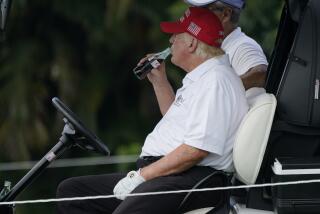An addiction stronger than privilege
- Share via
IT’S hard to come off as a regular guy when your father was a right-hand man to a president and still is a nationally renowned journalist and an icon of the liberal political establishment. “On November 22, 1963, my father joined Lyndon Baines Johnson and Jackie Kennedy on Air Force One as the plane sat on the tarmac at Love Field and witnessed the swearing-in of the new president,” writes William Cope Moyers in his book, “Broken: My Story of Addiction and Redemption.”
But Moyers, who now goes by “William” after years of being called “Cope” and decades of seeing himself almost exclusively as Bill Moyers’ son, pulls it off, letting the reader see him as one of the millions of Americans who have overcome addiction.
Sure, his was a privileged childhood. “There were Easter egg hunts on the South Lawn of the White House, trips on Air Force One, weekends spent at Camp David or at the president’s ranch in the Texas hill country, and dinner parties at our home in suburban Washington where President Johnson was the guest of honor.”
Yet Moyers shows the deceit, the games, the illogical and distorted thinking that fill up the day of someone whose only concern is getting high.
Even more, the book is a must-read for parents who are desperately rationalizing the frightening behavior of their offspring, refusing as so many parents do to believe there might be an addiction problem. If somewhere behind the curtain of family denial there lurks an inkling that something is truly wrong, Moyers’ story could bring a spark of recognition that just might shorten everyone’s pain.
The book is full of artfully written letters from father to son -- tender, loving and as perplexed as any other parent. Moyers’ parents were oblivious to their son’s love of marijuana through high school, to his rationalization that if the Beatles were getting high, why shouldn’t he, to his practice of getting stoned on the balcony while they were asleep.
That’s typical. In federally sponsored surveys, researchers at the National Institutes of Health consistently find that when teens admit to using drugs or alcohol, about half of their parents deny that their children are using.
So when, in college, a drunk Moyers ran off a road and wrecked the car, his parents believed the story that a farmer in a slow-moving tractor precipitated the accident. There was no farmer. And when the young Moyers was arrested for breaking into a fish store and stealing $20.06, they believed his story that it was nothing more than a college prank. It wasn’t. It was a solitary act of drunken delusion.
What followed was more than a decade of lies and deceptions, a ruined marriage and an addiction to alcohol and crack cocaine that was stronger than privilege. His deceptions finally ran out in 1988. He dried out at St. Vincent’s Hospital in New York, then went for treatment at the Hazelden Foundation, an addiction treatment center in Minnesota where he now works as vice president for external affairs.
But like many addicts, his recovery was peppered with relapses, three in his case, until 1994, when his distraught father tracked him down in a crack house in Atlanta. Before taking him for one more round of treatment, Bill Moyers looked his son in the eye and said, “There’s nothing more I can do. I’m finished.”
Addiction brings many loved ones to that point. Fortunately, William Cope Moyers was finally ready to take over for himself. Not surprisingly, as the son of a Baptist minister, Moyers returns to a theme of underlying spirituality, but without being preachy.
” [W]e are all broken, and the only ‘cure’ for our brokenness is to be broken together,” he writes.
More to Read
Sign up for our Book Club newsletter
Get the latest news, events and more from the Los Angeles Times Book Club, and help us get L.A. reading and talking.
You may occasionally receive promotional content from the Los Angeles Times.










